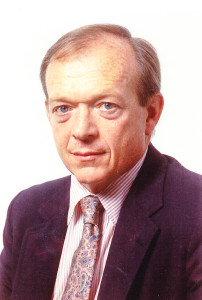Megan Tcheng
tchengme@grinnell.edu
Robert Sloyan, Pulitzer Prize winning reporter and author of “The Politics of Deception: JFK’s Secret Decisions on Vietnam, Civic Rights, and Cuba,” will be on campus this Friday to meet with students and talk about careers in journalism. Sloyan recently sat down with the S&B’s Megan Tcheng to discuss his journalism career, which has spanned more than 50 years.
The S&B: How did you get involved in the field of journalism?
Sloyan: I went into the army in 1955, right out of high school. It was the peacetime army. One of the guys had just gotten out of the Columbia journalism master’s program and another one had just gotten out of a program in Chicago. They both trained me. I learned everything about journalism in the army and when I got out of the army I started working for a daily newspaper in Albany, New York.
Just last year, you came out with a new book, called “The Politics of Deception: JFK’s Secret Decisions on Vietnam, Civil Rights, and Cuba,” which exposes some of the lesser known facts about JFK and his final year as president. What prompted you to write on this specific topic?
I covered Kennedy when I started to work in Washington at the United Press International Bureau. It was the year of 1960 presidential campaign: Kennedy against Nixon. I cut my teeth on that campaign. I covered the debates between Kennedy and Nixon as a dictationist. I knew Kennedy. I’d met him and, of course, I liked him. He had great speeches and, for all I knew, he was a really great president. But I didn’t know — and neither did my colleagues or the senior reporters in town — what he was really doing.
As a wire writer, your story changes during the day. You clean it up and do what’s called a write-through, where you write through the entire story — better written, with new facts. So I did a write-through of the Kennedy administration, 50 years after the fact. It’s based off of the tape recordings Kennedy himself made, secretly. I listened to 289 hours of these recordings and another 60 phone conversations. I am very critical of him. You can hear from the tapes what he actually did, as opposed to what he said he did.

What was the most rewarding aspect of your book writing experience?
It was more hard work. As I got in to it, certain tape recordings leapt out at me. There was one conversation, [about the execution of a coup South Vietnam,] where JFK approved bribing a Vietnamese general. The general took the bribe, led the coup, assassinated the president of South Vietnam, destroyed the government stability in Saigon, destroyed the military in Saigon — and Kennedy was assassinated three weeks later. Lyndon Johnson went to his grave blaming Kennedy for that overthrow. That was the most startling thing I uncovered in my book.
How do you think the field of journalism has changed during your time as a reporter?
Clearly a lot of newspapers have lost circulation and have lost income, so it’s more difficult to get a job. Big newspapers, in particular, have suffered. Smaller newspapers, though, in prosperous cities, have done pretty well — so you can have a good career. Then there’s always television, and then there are a bunch of Internet-based news organizations that are hiring reporters. So there is a different career out there for new reporters.
The trouble with [some online news sites] is that they’re totally unreliable. You don’t have the same discipline as honest-to-god newspapers. You don’t have editors saying, “Where did you get this?” or “Is this right?” Instead you have people who are just trying to make a buck.
What advice do you have for aspiring reporters — or, for that matter, aspiring authors in general?
It’s important to read history and to read literature. You need to have that depth of knowledge of the world — depth of knowledge of different countries and different cultures. Also, if you read literature, you can improve your writing skills.
You can learn journalism very quickly. You get the facts — who, why, what, when, where — and, in the first year or so, you can become pretty skilled at gathering information. But you have to bring to the job an understanding of the world and an understanding of people. That’s what you get through your education. You have to realize how little you know and how much there is left to learn.

















































